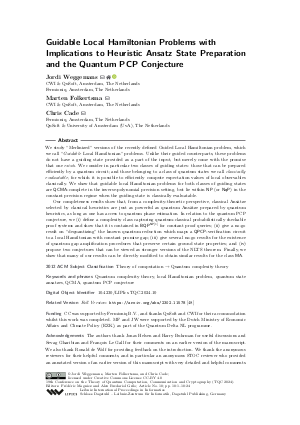LIPIcs.TQC.2024.10.pdf
- Filesize: 1 MB
- 24 pages

 Creative Commons Attribution 4.0 International license
Creative Commons Attribution 4.0 International license

We study "Merlinized" versions of the recently defined Guided Local Hamiltonian problem, which we call "Guidable Local Hamiltonian" problems. Unlike their guided counterparts, these problems do not have a guiding state provided as a part of the input, but merely come with the promise that one exists. We consider in particular two classes of guiding states: those that can be prepared efficiently by a quantum circuit; and those belonging to a class of quantum states we call classically evaluatable, for which it is possible to efficiently compute expectation values of local observables classically. We show that guidable local Hamiltonian problems for both classes of guiding states are QCMA-complete in the inverse-polynomial precision setting, but lie within NP (or NqP) in the constant precision regime when the guiding state is classically evaluatable. Our completeness results show that, from a complexity-theoretic perspective, classical Ansätze selected by classical heuristics are just as powerful as quantum Ansätze prepared by quantum heuristics, as long as one has access to quantum phase estimation. In relation to the quantum PCP conjecture, we (i) define a complexity class capturing quantum-classical probabilistically checkable proof systems and show that it is contained in BQP^NP[1] for constant proof queries; (ii) give a no-go result on "dequantizing" the known quantum reduction which maps a QPCP-verification circuit to a local Hamiltonian with constant promise gap; (iii) give several no-go results for the existence of quantum gap amplification procedures that preserve certain ground state properties; and (iv) propose two conjectures that can be viewed as stronger versions of the NLTS theorem. Finally, we show that many of our results can be directly modified to obtain similar results for the class MA.


Feedback for Dagstuhl Publishing